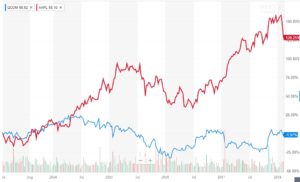When stock markets rumble, many investors rely on the benefits of diversification to help reduce volatility in their portfolio. But what about those investors who own a high concentration of a single stock? Employees of large tech or biotech companies or executives at publicly traded companies are often compensated in Restricted Stock Units (RSUs), stock options, or will participate in an Employee Stock Purchase Plan (ESPP). These compensation programs may lead to individuals holding large, concentrated positions in a single stock rather than the preferred diversified portfolio recommended by most financial professionals.
Take Apple, for example, where tens of thousands of Apple employees have created substantial wealth simply by participating in their employer stock plans and holding on to their shares for many years. For comparison, consider a company like Qualcomm where many employees have taken advantage of similar opportunities. Shown in the stock chart below, for the past 5 years the Apple employees (AAPL in Red) are likely quite pleased with their concentrated Apple stock portfolio, whereas the Qualcomm employees (QCOM in blue) may be wishing they had more diversification over the same time period. In other words, part of the success or failure of a concentrated stock depends on the stock you own. That is precisely why it often makes sense to diversify your portfolio, because you never know how any one company will perform.
 Source: Yahoo Finance (February 2013-February 2018). Past performance is not a guarantee of future results.
Source: Yahoo Finance (February 2013-February 2018). Past performance is not a guarantee of future results.
Making matters worse, when you own a high concentration of a single stock, unique events that impact that particular company will have a major impact on your portfolio value. Look at Qualcomm from July 2014 through early 2016 – the stock declined 37% in less than two years, during a time when the broader market performed quite well. If Qualcomm was the primary holding in your portfolio, you may not be able to tolerate that amount of decline or volatility. Also, Qualcomm declined 18% in just one-week in January 2017. Those are surely some sleepless nights if most of your net worth is tied to a stock that drops 18%. There are also times when a large stock position may have spectacular results, such as Apple’s 2017 returns, so it cuts both ways. Most investors aren’t equipped financially or emotionally to handle the amount of risk that comes along with owning concentrated stock positions.
So what is an investor to do? As always, we suggest seeking guidance from an investment advisor and/or tax professional. There are several strategies to consider when working with an investment advisor or tax professional such as:
- Dollar cost averaging out of the holding by selling small amounts over time to reduce the tax consequences.
- Hedging your exposure through advanced strategies to preserve the value and reduce the risk of decline.
- Making charitable gifts and avoiding capital gains if you have a low tax basis in a taxable account.
- Simply selling a portion of the shares in a short period of time and keeping a more manageable amount for the long-term.
This is not a complete list of strategies, but the main thing to remember is that each strategy will have its advantages and disadvantages. That is why it is important to enlist the help of an experienced advisor. With the help of an advisor, you can devise a specific strategy to allow you to diversify away from a concentrated stock holding while managing the tax consequences and overall impact on your portfolio. Meanwhile, you should keep your decisions focused on your long-term investment goals by not allowing a single stock to determine your financial future and by monitoring your exposure over time.
If you or an acquaintance have a large concentrated stock position and would like to know what strategies are available to you, please contact CCMI and speak with our team.
CCMI provides personalized fee-only financial planning and investment management services to business owners, professionals, individuals and families in San Diego and throughout the country. CCMI has a team of CERTIFIED FINANCIAL PLANNERTM professionals who act as fiduciaries, which means our clients’ interests always come first.
How can we help you?





